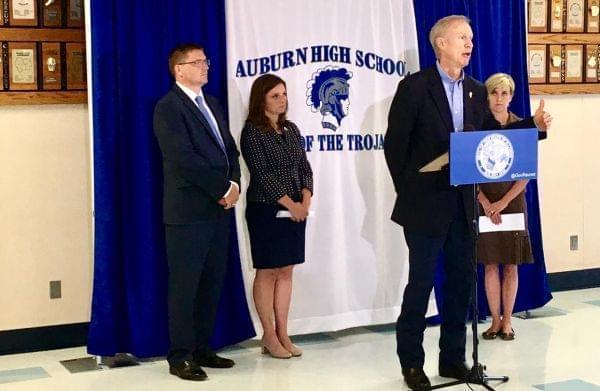Rauner Gives Dems A Deadline For School Bill

Gov. Bruce Rauner, flanked by Auburn superintendent Darren Root, State Representatives Avery Bourne (R-Raymond) and Sara Wojcicki Jimenez (R-Leland Grove), demands SB1 by Monday at noon. Dusty Rhodes/NPR Illinois
Monday at high noon — That's the deadline Gov. Bruce Rauner has given Democrats to send the school funding bill to his desk. The new state budget requires this revamped funding formula, but Rauner plans to veto certain parts of the plan.
He promises every school district -- except Chicago -- lots more money once he gets to veto portions of the Democrats' bill.
He calls that plan a "Chicago bailout," because it gives Chicago Public Schools credit for payments the district must make on its unfunded teacher pension liability.
"This is historic legislation. It's good legislation. It helps the children in Chicago just like the children in Auburn and the children in Decatur. And Danville. And all over the state of Illinois,” Rauner said Friday morning, at what was his fourth school funding press conference of the week.
He has been traveling the state, saying will use his amendatory veto to send more money to downstate schools. But a third of the dollars he plans to give downstate districts come straight out of Chicago Public Schools’ block grant, which he plans to cut by at least $200 million. That’s not a point he’s been emphasizing in his appearances, and when I asked him about it, he seemed fuzzy on the facts.
"Chicago has received a special block grant that no other school district gets,” he said. “Auburn doesn’t get any of that money. Springfield, Decatur doesn’t get any of that money. And that was put in place more than 20 years ago because Chicago pays its own pensions. So we, all of us in Illinois, taxpayers, have been funding Chicago extra money — $250 million per year, in large part because Chicago pays its own teacher pension."
In reality, the CPS block grant has no formal relationship to pensions. All districts receive state reimbursement for seven “categoricals” above what they receive in General State Aid. Every district except Chicago has to submit vouchers to get reimbursed for these categoricals. But since 1995, Chicago has been reimbursed via a block grant, based, at least in part, on the reality that submitting claims for thousands of different students was burdensome. Over the years, as CPS enrollment has declined, the block grant resulted in the district receiving $250 million more than it would if it had to submit vouchers for reimbursement.
Rauner’s education czar Beth Purvis has said those extra funds have been audited, and aren’t being misspent. “There’s no implication that CPS is misusing those funds in any way, shape or form,” she told me in May. “We believe that they’re using them for the educational costs of educating those children.”
Nevertheless, all Republican plans would eliminate CPS block grant overages for at least three of those seven categoricals, resulting in a loss of $202 million, which would then be redistributed to other districts. That’s one reason Rauner’s online spreadsheet shows much more generous payouts to downstate schools.
He hasn’t shown the work behind his calculations, and said he didn’t know whether the Illinois State Board of Education had been involved in the creation of the spreadsheet. ISBE, which is headed by Rauner appointees, traditionally models funding proposals using their in-depth database. Full models of other proposals, including SB1, sponsored by Sen. Andy Manar (D-Bunker Hill) and SB1124, sponsored by Sen. Jason Barickman (R-Bloomington) are available at isbe.net.
Rauner also plans to eliminate the credit SB1 gives for CPS for the payments the district must make on unfunded teacher pension liability. The state already pays all other teacher pensions through the Teacher Retirement System, which also carry a substantial unfunded liability, set to increase by about $600 million.
Rauner says if Democrats fail to deliver the bill to him on time, he’ll call lawmakers back for another special session, and keep them in Springfield every day until the school funding issue is settled. He set a deadline of July 31 to have the legislation finalized. School districts expect state dollars to start appearing in their bank accounts no later than Aug. 10.
Senate President John Cullerton (D-Chicago) issued a statement saying a special session would be expensive and divisive. Instead, he encouraged the governor to convene a meeting of legislative leaders.
